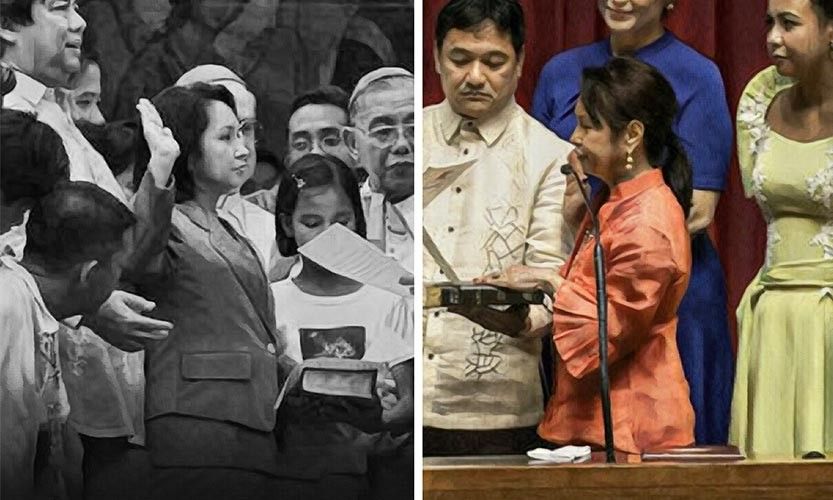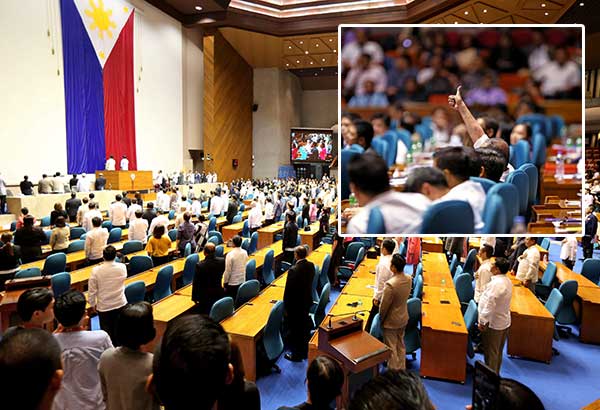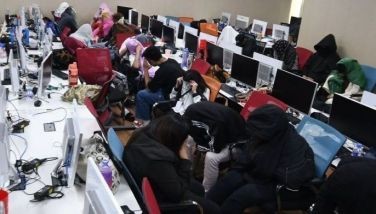Arroyo's return to power: What it means and what could happen next

MANILA, Philippines — Hours before President Rodrigo Duterte delivered his third State of the Nation Address on Monday, a power struggle among lawmakers unfolded before the public.
On the morning of July 23, House Speaker Pantaleon Alvarez (Davao del Norte) addressed his colleagues and listed the House’s achievements under his leadership. He did not touch on reported talks to oust him as speaker, which grew stronger over the weekend.
In what was seen as an attempt to stop the change in leadership, the House adjourned its session before noon, missing the anticipated ratification of the Bangsamoro Organic Bill to the dismay of many.
READ: House fails to ratify Bangsamoro Organic Law for SONA
Minutes after the session was adjourned, a manifesto was passed around among the members of the House, signifying a vote to elect Arroyo as House speaker.
In a muted—literally and figuratively—affair, Arroyo took her oath as House speaker.
But it was still Alvarez who greeted Duterte upon his arrival at the Batasan. The apparent power struggle delayed the president’s constitutionally mandated speech by more than an hour.
After Duterte finished his SONA, lawmakers and guests started pouring out of the plenary and giving their comments to the president’s speech, but some solons stayed back at the plenary to deliberate on change of leadership at the lower chamber.
At around 8:51 p.m., Arroyo, a former president charged with graft, made a political comeback: She had officially unseated Alvarez—who had had her unseated as deputy speaker in 2017—as leader of the House of Representatives.
READ: House formally elects Arroyo as speaker
House speaker's powers
The speaker is the fourth highest official in the Philippine government and is elected by a majority vote among members of the House of Representatives.
According to the House website, the speaker “presides over the session, decides on all questions of order; subject to appeal by any member, signs all acts, resolutions, memorials, writs, warrants and subpoenas issued by or upon order of the House; appoints, suspends, dismisses or disciplines House personnel and exercise administrative functions.”
According to the rules adopted by the House of the 17th Congress, the speaker also prepares the legislative agenda for each regular session and has the responsibility "to ensure full deliberation and swift approval of measures included therein."
The speaker is also tasked with conducting monthly caucuses, or as often as necessary, to discuss priority measures and to thresh out issues and concerns among members.
They also "exercise general supervision over all committees and, in furtherance thereof, conduct regular monthly meetings with the chairpersons and vice-chairpersons of all standing and special committees" to review performance and to check that the panels' priorities "are attuned to the legislative agenda of the House."
Among the legislative measures that Duterte is pushing is the shift to a federal form of government

Lawmakers stand for the national anthem at the plenary hall of the House of Representatives during a special session tackling the extension of martial law in Mindanao in July. Inset shows a congressman with a thumbs up sign to vote in favor of the extension. BOY SANTOS, MIGUEL DE GUZMAN, file
Before he was replaced, Alvarez presided over a House that readily affirmed and later approved two extensions of martial law over Mindanao. It also impeached Andy Bautista as Commission on Elections chairman and set in motion the removal of Maria Lourdes Sereno as chief justice.
After he had voiced displeasure at the Commission on Human Rights, a member of the Alvarez-led majority proposed and managed to get approval from the body for an annual budget of P1,000 for the constitutional body. That decision was walked back after outrage online and opposition from the Senate.
Aside from pushing the legislative agenda, a speaker also has the authority to "sign all acts, resolutions, memorials, writs, warrants and subpoenae that may be issued by or upon order of the House."
In consultation with the Committee on Rules, the speaker is tasked with coming up with guidelines "governing public access to personal data and related information, including Statements of Assets and Liabilities, of Members of the House."
READ: Who's who: Richest, poorest House members in 2017
The speaker also has the power to review, approve and sign contracts on behalf of the House of Representatives.
Arroyo as prime minister?
Sens. Grace Poe and Panfilo Lacson have expressed worry at Arroyo’s ascension to power as her being a step closer to becoming a prime minister.
Speaking to reporters after SONA, Poe warned that the change in House leadership "gives a bad impression."
"They have something that they want to push for—a change in our constitution," she added.
However, the final draft of the Federal Charter, as crafted by the consultative committee handpicked by Duterte, does not mention a position for a prime minister.
The president is expected to back this draft, as he has touted the federal form of government even before he has come to the presidency.
The proposed federal form of government will retain the three branches of government in the 1987 Constitution: An Executive branch led by a president and vice president elected as a team; a legislature with a Senate and House of Representatives, and the judiciary with a federal supreme court.
However, Congress could convene itself into a Constituent Assembly and work on a charter different from the one submitted by the president's consultative committee.
A ConAss would allow the members to vote on amendments of the Constitution and introduce revisions to the charter.
It is one of the three ways to revise the Constitution, with the other two being through a constitutional convention, where the public can elect delegates to amend the charter, and through a people’s initiative, where voters across the country will be allowed to either approve or reject proposals.
A group of academics already flagged this mode to amend the Constitution as they said, the process “must be much more participatory.”
Should a parliamentary form of government, instead of presidential form, be pushed and approved in Congress, and the amendments ratified in a plebiscite, the Philippines would have a prime minister.
The prime minister will be chosen from within the ranks of the legislative branch. With Arroyo’s rise to be the top legislative leader at the House of Representatives, she may be one of the candidates to assume this position.
A prime minister, under a parliamentary government, will serve as head of government while a president will act as head of state.
Sen. Lacson, however, warned that if Arroyo’s “ascension to the speakership is a prelude to becoming prime minister, they better think twice because the Senate, both majority and minority have agreed to close ranks to defend and assert our role under the 1987 Constitution in revising or amending the same.”
“That, I can say with certainty and conviction,” the senator stressed.
House members are reported to be staying after the SONA to elect a new speaker. Earlier, a power struggle in the House leadership happened between Rep. Gloria Arroyo and Rep. Pantaleon Alvarez.
Presidential daughter Sara Duterte was rumored to be behind the push for Arroyo to lead the lower chamber.
House Speaker Alan Peter Cayetano says P100 million was not allocated for congressmen, but for districts in the 2020 budget. The amount, he says, was varying based on submissions of the representatives.
He insists, however, that the amount is not pork barrel, which was ruled unconstitutional by the Supreme Court in 2013.
Pork barrel was the lumpsum funds legislators received supposedly for projects in their districts. Controversies, however, point to massive corruption of the funds siphoned through bogus non-government organizations.
After yesterday's election that named President Duterte's running mate Alan Peter Cayetano the new House speaker, Rep. Bienvenido "Benny" Abante (Manila) wins the election installing him as new minority leader.
The minority bloc chose Abante at a convening of members. He was elected in mere seconds and faced no objections.
Abante was one of the two candidates for House speaker formally nominated at the opening of Congress yesterday ahead of the joint session with Senate and the president's State of the Nation Address. (PTV photo)
President Rodrigo Duterte publicly naming who the next speaker of the House of Representatives will erode the lower house's independence, Rep. Carlos Zarate (Bayan Muna party-list) says after the president's announcement that Rep. Alan Peter Cayetano (Taguig) would share the term of speaker with Rep. Lord Allan Velasco (Marinduque).
"As expected, contrary to his previous statements letting members of the House to freely choose their leaders, Pres. Duterte 'stepped in' in the House speakership race to salvage his already` fractious coalition and, hopefully, secure its survival until 2022," he says in a press statement.
Zarate, a member of the Makabayan bloc at the House, says even with the term-sharing agreement brokered by the president, "the different factions and their political and economic backers are expected to still wage a war of dominance in the coming days, especially with 2022 presidential elections already in the political horizon."
He adds: "With this politics of convenience and presidential intervention, the independence of the House is again severely compromised and the interest of the majority of the people sacrificed."
Davao City Rep. Paolo Duterte, the president's son, says he is no longer vying for the top spot at the House of Representatives.
"I have personally spoken to President Rodrigo Duterte Thursday night in Davao City regarding my plan to run for speaker of the House of Representatives. We both agreed that this will not be the right time for me to be Speaker and I can still help his administration from the House in a different capacity," the younger Duterte says.
"As President of Hugpong sa Tawong Lungsod, I will support the bid for speakership of Congressman Isidro Ungab from our sister party, Hugpong ng Pagbabago," he adds.
As the rivalry for the speakership heats up, presidential children Rep. Paolo Duterte (Davao City) and Davao City Mayor Sara Duterte form a "Duterte Coalition" as a call for unity at the House of Representatives. Paolo leads regional party-list Hugpong sa Tawong Lungsod while Sara leads Hugpong ng Pagbabago.
Speaker hopefuls Reps. Alan Peter Cayetano (Taguig), Lord Allan Velasco (Marinduque) and Martin Romualdez (Leyte) are also being urged to be part of the coalition. Velasco, however, is the endorsed nominee of ruling party PDP-Laban.
Other members of the coalition are Reps. Isidro Ungab (Davao City), Vincent Garcia (Davao City), Corazon Malanyaon (Davao Oriental), Manuel Zamora (Compostella Valley), Lorna Bautista (Davao Occidental), Claudine Bautista (Dumper party-list), Sandro Gonzales (Marino party-list) and Anton Lopez (Marino party-list).
Velasco and Romualdez, meanwhile, also welcome the formation of the coalition in separate statements.
- Latest
- Trending





























